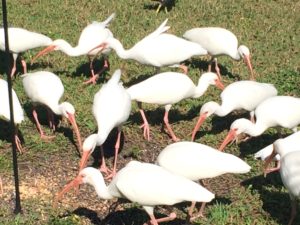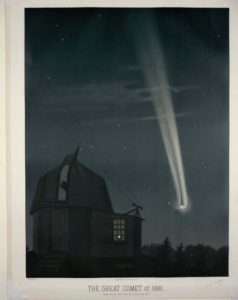I was rather at loose ends about what to read; Book 5 is currently undergoing massive restructuring, and much of what I unwisely tried to cram into it really doesn’t belong at all — and yet the stuff that must go is currently so completely woven in that extracting and reconfiguring is nearly a page-by-page project.  Finding a half-hour’s worth of material that is readable and yet contains nothing of what must go wasn’t easy.
I settled on this, which while not the most adventurous or exciting scene, has at least a very good chance of actually being in the final version, in more or less this form.
The sky. That was the problem: the whole bloody sky.
    Artos tried not to look up each time he thought of it, tried not to point his face upward. But all the long way home from the Archives, following his own tracks from yesterday, it was open countryside, once he got out of the forest, and the clean blue sky all around. It seemed almost as if there was more sky than usual.  Artos caught himself hunkering; he thought of rabbits crouching when they suspect a hawk above.Â
    He forced himself to relax. Of course he was being watched; of course.  And he always had been.  Nothing was different about that.
    But he’d read Rowan’s logbooks as they came in, and today he felt those eyes up there. Â
    Suddenly angry at himself, he pulled his horse up and sat straight in the saddle. He looked up.
    “Yes, it’s me!” He shouted, and flung out his arms. “The Duke himself! Are you watching up there, you bloody buggers?” Beneath him, the horse startled, shuffled for traction, gathered itself, then bugled.
    “Ho!” Artos reined in, shifted his seat, and man and horse wheeled in place. Artos spoke gently. “No, Oscar, lad, sorry, no. Not off to battle, not today.” Oscar calmed, then shook his head and snorted disappointment, and allowed himself to be directed back on the trail.
    No way to tell if anyone was watching Artos, really.  Any number of wizards, even Corvus, might be gazing down right now… or none of them. Only the magic spells, doing the watching on their own. Making their mysterious records. Â
    What would that be like, to see from so far above? Hills and towers, Artos had been on, and in.  Although, mountains… he had never climbed fully up a mountain.Â
    As a boy, he’d been brought by his uncle on a visit to The Crags, and young Artos had stood at the rail and gaped down the cliffside at the narrow water far below; then discovering that he had no way to think about it, decided that the correct response was to laugh, and to throw things off the edge, until the proctors came and admonished him.
    But in a place so wide and clear as this, to be high up looking down, — it must be like a map he supposed, like looking at a living map.
Â
    It took him until afternoon to reach the city, Oscar surging through drifts then climbing over banks left by the plowing.  Deeper in the city, the streets were lined with mounds, many of them carved by the children into warrens and forts, and one rather nice castle tower. The street-cleaners had borrowed a number of horses – including a pair of draft animals from the Duke’s own stables — and were dragging planks. One of these, “Old Biter”, had an iron edge and was treated with wry respect by the cleaners.
    Artos wondered if there were some magical way to clear the snow from the streets. That would be useful.Â
    Oscar sidled around Old Biter, then scaled halfway up a snowbank, and came back down into the street ahead of the draft horses, snorting his derision. He liked to be in front.Â
At the crest of the little hill on Agee Street, by Marranne the healer’s house, Artos could see south all the way to the harbor, and west all the way to the river. Snowy roof-tops with chimneys trailing pale smoke crowded each other, to the limit of a single open area: the grounds of the Duke’s mansion. The two towers at either end of the building now looked out on a field of snow on the left and a similar-sized muddy area just inside the entrance gate, where two banners had been raised, lying flat in the still air.
    Banners? Why would they put banners out?  He’d only been to the Archives and back. He never had them banner his return from so short and near a visit. He shaded his eyes against the sunlight.
    From the right-hand banner, a glint of silver…
    Artos felt something twist in his chest. No – not the wizard, not now, not so soon! Oscar stamped and fussed: Artos had pulled him up short.Â
    Stupid thing, showing them your face like that. But a man ought to be able to look at the sky!Â
    He slacked the reins and let Oscar take his own time climbing down the wet cobbled street.    Â
    On level ground, the houses were close again, but the mansion gate was high, and the banners clearly visible.Â
    To the left, his own green and gold, with the ship and the wolf’s head. To the right — Artos released his held breath and relaxed — not black and silver, but blue and silver.
    He squinted up at it against the sky as he neared: two leaping stags in sliver on a field of blue. It was no banner he knew.Â
    There were few enough families calling themselves noble in the Great Wulf Valley, and only another handful between the Uplands and Greyriver.  He knew all their banners. The Crags, on the other hand, fairly bristled with heraldic symbols, but this one didn’t seem to be made in the Crags style. As banners went, this one could be better. The whole of it seemed to be embroidered, instead of just the symbols, and it would take a stiff breeze to make it fly bravely.
    As he dismounted by the gate, someone sounded a trumpet, sending clean notes out into the winter evening.
    Banners and trumpets.  The Duke of Wulfshaven and the Lower Wulf Valley stood in the muddy, snow-piled street, puzzling and scratching his beard. Finally he shrugged, and entered the gate.
    An attendant hurried up to take Oscar’s reins. Across the yard, Artos sighted a huge bearskin coat topped by a short thatch of gray: Mascha, bundled against the cold, making her way across the yard. He met her halfway and continued on; she fell in behind.
    “Who’s here?” He asked.Â
    “The Baron of Cerlew arrived yesterday afternoon. Apparently his messengers were delayed by the snow, and he overtook them. We had no forewarning.”
    “‘Baron’?” He paused. “Of Cerlew, you say?”
    “Or Finnan, as you previously knew him.”
    He put his brows up. “Really? Calling himself a baron now, is he?”
    She inclined her head. “Apparently so, my lord.”
    He chewed his lip a moment. “Good. That’s good.” He continued on his way.
    “My thought exactly,” she said, following.Â
    They wended along a newly-cleared path to the side of the mansion. The snow-banks rose to Artos’ waist. “It must have been hard travel for them. How many people in all?”
    “Sixteen, including servants and the two messengers they overtook.” At Artos’ wince, Mascha continued: “Of persons requiring noble treatment, there are the Baron, three male companions whom he treats nearly as equals, a dowager who seems to be a sort of distant cousin, and the Baron’s daughter. There are four servants – two for the men, two for the women. Baron’s men-at-arms, numbering four, are bunking with our regulars, where the addition will cause no hardship. The messengers are with the stable-hands; they’re just glad to be warm.”
    They reached the side-door, and the mudroom, where Artos handed his coat to the lad whose job it was to tend to such things, apparently; it was rarely the same person twice. Artos had stopped trying to learn their names. It seemed like every young person in the city passed through the Duke’s household at some point. It had become a sort of local tradition.Â
    Artos sat on a bench, and waved the boy back when he tried to remove the Duke’s boots. Artos disliked having servants dress or undress him.  “Has our new Baron mentioned anything of why he and his people slogged their way through the dead of winter to come here?” He pulled one boot off and handed it to the boy, who stood there awkwardly juggling the Duke’s heavy coat on one arm, the boot in his opposite hand.Â
    “No,” Mascha said. Then added: “My lord.”
    He squinted up at her. From long experience, Artos now knew by her tone that the answer was glaringly obvious to even the dumbest stump in the forest. He probably already knew it, but at the moment he couldn’t winkle it out of his brain, which was still full of wizards, and steerswomen, and betrayal.Â
The answer would come to him presently; he let it pass. “Well.” He gave the other boot to the boy, whose fumblings approached a climax; Artos watched cheerfully, and at the last moment took it back and handed it to Mascha. “And I wasn’t here to greet the Baron,” he said.
    “I explained the situation, and your closeness with the residents of the Archives.”
    “We haven’t insulted him, have we?”
    “I don’t believe so. When I apologized for the lack of appropriate ceremony, he seemed a bit relieved.”
    “Hm. I can’t decide whether that speaks well of him, or not. At least we’ve got his banner up.”
    “His very own, the moment.  Our seamstress should have a copy by morning.”Â
    Artos rose and tousled the cloak-boy’s hair, which inspired a shy grin. Mascha slipped out of the bearskin, revealing the small, trim woman beneath. She passed the coat to Gaff who took it and hustled the boot-boy off.Â
    “Any news while I was away?â€Â Artos glanced about for his house-shoes, inspiring three different servants to set off on scurrying searches. He gave up before they were successful, and went striding out of the mud-room and down the tiled side corridor in his stocking feet.
    Mascha followed, a step behind. “My lord,” she said, “it’s been less than three days. And winter holds the land.”
    “It holds it here,†Artos said. “Perhaps the cold hasn’t settled as hard to the west.”
“There is no way to know, my lord. Unless you care to ask the wizard.”
    “No,” the Duke said. “I definitely do not care to ask the wizard.”
    They went on, Mascha somehow managing to communicate by posture and controlled expression her disapproval: of the Duke’s stockinged feet, his use of the servant’s corridor, and his unwillingness to wait until he reached his office to discuss business. She also managed to indicate that whatever the Duke chose to do was perfectly correct, by definition. Artos wondered how she accomplished such feats of subtlety; she was a constant astonishment to him.  He loved her completely, as a boy loves his dog.Â
    He was immediately ashamed of the comparison – but no, come to think of it, it was really no insult.  There was something wonderful about the love between boy and dog, wasn’t there? A simpler emotion than other loves, and cleaner somehow, wholly pure and glad. Â
    And when you think of it, the dog was not an unequal partner in the relationship — not if the boy were a good boy, and the dog a wise one.Â
    They were alone in the corridor; Mascha moved a bit closer. Artos slowed down, alerted and interested. “No formal news has arrived, my lord,†she said quietly, “nothing from our established sources. However, a cargo sled came in yesterday –“
    “With a message?”
    “No, my lord. But it did carry a passenger — a girl, either an orphan or a runaway. From Shadsburrow.”
    Artos stopped short, and turned. He beamed down at her. “And now?”
    Mascha took the moment to gracefully herd him into his study, by way of the servant’s door. She closed it behind him. “She needed work. I offered her employment. She’s in the stables.”
    “Good.” He stood before the hearth a moment, purely by reflex; it was unlit. He quirked a smile at himself, then strode to his desk and sat behind it. “Have we learned anything from her yet?”
    “We haven’t yet tried to, other than the fact of her existence and former home. Shall I send for her now?”
    Artos drummed his fingers.  “I haven’t seen her to judge… What’s your feeling?”
    “Unfortunately, she’s rather simple. But with general good treatment and a certain amount of contact with you personally, I believe she’ll become desperately devoted to you. And that will gain us more information in the end than an inexplicable and possibly frightening interrogation now.”
    “Hm. ‘Desperately devoted?'”
    “Yes, my lord. She’s of an age, or seems to be. Twelve, perhaps thirteen, and alone in a strange place. She needs someone to admire. Kindness from the powerful — not to mention handsome — Duke of Wulfshaven will go a long way. Especially if it can seem unfeigned.”
    He presented her a glower. “I’m always kind to children. I don’t need to feign it.”
    “Of course, my lord.”
    “Well, I hope she hasn’t learned thieving ways.”
    “I’m certain she has, but I suspect she will hold off unless she’s ill-treated.”
    Shadsburrow… Good.  There’d been some business going on in that area just after harvest, some disturbance, dislocation. Something. His sources there should have used that same cargo sled to send further messages, but they hadn’t. That was worrisome.
A soft knock on the servant’s door. Mascha opened it to admit a manservant with a canvas carrier of wood, atop which perched the Duke’s lost house-shoes. Mascha took the shoes and passed them to the Duke, and the servant set to laying and lighting the fire. “My lord, may I ask how matters stand at the Archives?â€Â
    “Matters stand as matters have been standing… They let me speak to the Prime, but, well, she fell into a doze in the middle of a sentence. She knew enough to apologize when she woke again, but still… I don’t believe things will improve.  Not any more.â€
    “And when the worst happens – as it seems it must, my lord — who will lead them?â€
    “‘Lead’ isn’t the right word.  It’s a little hard to describe how they organize themselves… largely because I don’t understand it myself. But the answer is ‘no one.’ And the way they work things, that wouldn’t have much of an effect, for a while. Under normal circumstances.â€
    “No successor has been chosen at all?â€
    The Duke leaned back and threw out his arms in frustration. “No, damn it! They have to wait for the Academy to take place — that’s how it’s done, apparently. But the Academy isn’t until Autumn, and we need to know what’s what, right now.â€Â Wizards, betrayal, and bloody death…  “The timing couldn’t be worse.”
    Mascha waited for the fire to catch, and the servant to depart. “I must disagree, my lord,” she then said politely. “A year from now would be worse, and two years worse still. Had the Academy taken place as originally scheduled, the matter would be resolved and the next Prime would be known and, I should hope, in transition to her new standing. That would have been the most convenient.”
    “You’re right. But I guess we don’t expect to die.  Hard to plan for that.”
    “Not at all, my lord. One merely looks ahead, and ensures that arrangements are in place as early as possible.”
    He supposed that Mascha was a person who did plan such things, to the detail.  It occurred to him that she probably had her burial plot picked out and the division of her properties decided. Possibly she had her own eulogy written, and filed away somewhere.
    He rose, and brushed his clothing down with his hands. “Well, what do you think? Shall I greet our guests dirty or clean? Which would flatter the new Baron’s pride? That I be in such a hurry to see him that I waste not a moment, or that I so admire him that I want to make a perfect presentation?” She opened her mouth to speak – but he said, “No, wait,â€Â and thought. She stood by patiently. Â
    Artos considered the times he’d met Finnan, and everything that had happened or might have happened between. “Can we manage a banquet by tonight?â€
    “Arrangements are already in progress.â€
    “And is Red Davey still bunking with the soldiers?â€
    She nodded. “The seamstress is fitting him with appropriate clothing, and I’ve stressed to him that he must play only instrumental compositions, and not, under any circumstances, sing.â€
    “Well… I’ll probably let him sing – if the night gets late enough, and we all get drunk enough, and all the really gracious persons have gone to bed. Send Finnan this message.â€
    She tilted her head to indicate he should proceed; Mascha could, for short periods, remember long messages word-for-word.Â
    Artos dictated: graceful formal greetings; appologies for Artos’ absence, somewhat less formal; a few words about the banquet to come, less formal still; a bit of reminiscence; eventually ending with: ” — and glad to have you here, you snaggle-toothed old fart.’â€
    Mascha gave a small smile.  “Just so, my lord.â€Â
Â
    Artos and Finnan had first met at the end of the last wizard war, when it was all over and magic had departed the field of battle.Â
    Artos had the remains of an army; Finnan had a gaggle of allies no better than himself, and a mob of rough men and women. But the Red, Finnan’s side, had won.Â
It was not what Artos had expected. The Blue had Abremio, assumed to be the most powerful wizard; and Corvus, whose magics Artos and seen close-hand; and Jannik, who could actually command dragons.Â
The Red had Isara, who, it was said, cared little for people and much for the land; her spells were usually less visible, slower-working.  Artos had assumed her weaker than the others. Mad Olin was a mystery, and the oldest living wizard – if, that is, Olin was the same man across nearly three hundred years, and not merely the latest who used the name. But he had no fortress or armies that anyone knew of, and tales of his spells seemed more folklore than fact.
And the Red had Shammer and Dhree, who had come from nowhere, built a fortress by magic, and declared a new holding. It was their war — but their abilities were unknown.    All the strength was on the Blue side, so it had seemed.Â
    But Isara demonstrated exactly how little she cared for people, sending wave after wave of terrified, ill-equipped men and women, and not a few children, letting them fall under Blue swords and pikes, and sending more. Shammer and Dhree had found some way to gather and direct the wild and leaderless people of their holding; and there were spells of confusion. Olin’s unexpected forces did their fighting on a second front in the east; but the wizard had proved his madness by sending a basilisk into the western ground battle, and people fell, and fell, untouched.
    And all the while, above, the magical part of the war waged itself in lights and thunders, wizard against wizard.Â
    At the end of it all, in the eerie quiet, Artos and Finnan had approached each other. Finnan pretended to bluster with pride of victory; Artos pretended dignity in defeat. They saw through each other immediately, and dropped the poses.Â
They sat; they drank; they spoke. They exchanged prisoners, shared out supplies equally, and led their people home.
    They had met again two years later, at Finnan’s rough hall, a year after Shammer and Dhree’s fall. Since then, only occasional messages back and forth.
    And now Finnan himself was here in the mansion, with a retinue, a banner, and a title. Good, Artos thought: the lands around Lake Cerlew were going to need organization and authority. Good – but why had Finnan come here?
Â
    Artos bathed, while Mascha briefed him on the plans for the evening. She spoke standing behind a decorative screen, a habit that always amused Artos. He didn’t particularly care if she saw him in the altogether, but she had her own sense of propriety.Â
    A manservant brought in clothes; Artos considered the choice presented, and requested a few changes.  After he had donned enough to be decent, the screen was removed.  Mascha watched as he completed the details of dressing. Artos strode over to the big glass and studied the result.  He stood there for a long time.
    Then he turned about and spoke to Mascha. “How do I look?â€
    She tilted her head. “My lord, you just spent a full minute gazing at yourself in a mirror.â€
    “It didn’t tell me what I need to know. How do I look?â€
    She considered. “Was it your intention to dress so opulently?â€
    “Yes, it was.â€
    “The quality of your shirt doesn’t match the quality of your vest.  If I hadn’t witnessed the act, I’d say you dressed in haste.â€
    “Good.â€
    “And therefore took whatever was closest to hand.â€
    “Also good.â€Â Â
    She nodded.  “The general impression is both of  wealth and indifference toward wealth.â€
    “Perfect. What else?â€
    She examined him, up and down, ending with up. “Was it five years ago that you last saw him?â€
    “Yes…â€
    “You were less gray then.â€
    “That’s true.â€Â It was in his family, to go gray early. Artos had seen his first gray hairs before he was twenty.  Now he was salt and pepper, long before a man ought to be due.
    “It makes you difficult to evaluate. You have strength and great energy. And yet, so much gray… a stranger would not know if he were seeing a man in his prime who has gone gray through great strain and worry, or a much older and therefore wiser man who has somehow retained all the vigor and enthusiasm of youth.â€
    “Throws people off balance.â€
    “At the very least.â€
    “That’s never a bad thing.”
    Clean and very well dressed, Artos stepped out of his dressing-chamber, turned down the corridor, and came face-to-face with a strange woman.
    It took him aback. It took him a moment to guess. Not a servant, by her clothing: very fine, if a bit light for the season. For warmth she had a shawl about her shoulders, rather nice lace backed with something heavier. It looked, now he saw it, like material originally intended for a curtain or an especially fine table-cloth. But it was draped and shaped well as a shawl, and the edge was trimmed with silver thread, a good effect.
    The Baron had two women in his retinue…
    “Oh!†she said, as surprised as he. She made something like a curtsey.  “My lord.â€Â Â
    He had not seen her in five years, at which time she was – what, eleven? A skinny thing all knees and elbows, hiding under the table with the dogs.  Now she was tall and slim, brown-skinned and gold-haired, brown eyes with a tinge of green.
    He opened his mouth to greet her, then realized that he actually could not remember her name. In Finnan’s hall she had been addressed by various nicknames, but Artos was certain she no longer answered to Addy-Ad. Nor, for that matter, Scratch-Butt.
    “Adalie, my lord,†she provided without prompting.
    And yes, Artos said to himself, the Duke of Wulfshaven is in fact the dumbest stump in the forest.
    He grinned to mock his own surprise. “So it is, the Lady Adalie herself! And look at you!â€Â He took one of her hands and with a dance-prompt, caused her to turn. She laughed, no longer ill at ease. “I hope your trip wasn’t too ardurous?â€Â
    One flick in her eyes: the word was new to her, but she figured it out. “It was, my lord, dreadful in every way! Except for the inns. I wondered why we bothered at all – oh, but now I’m glad, your home is so beautiful!â€
    “If it pleases you, then it’s served its purpose.â€Â  No, wrong thing to say — don’t be gallant!Â
    “I’m in one of the tower rooms –“ she pointed up and back: the stairs to the East Tower. “It’s so wonderful to be up in the light! And I can see so far into the city!â€
    “I had that room myself, as a child,†he said without thinking, then suppressed the urge to thump himself on the forehead.
    “Really?â€Â She was delighted.
    No, don’t create a connection between the two of you! But too late: now she could not help thinking of him in that room — the room where now nightly, she would shed her clothing, and slip shivering into her nightshift, and clamber into the deep soft bed, all alone.  And where she would gaze through the dark at the window strewn with winter stars, and perhaps imagine a boy standing there, looking out.  A boy possibly handsome, possibly winsome, dreamy, surely lonely — who would grow into the big great Duke who now greeted her with a smile and such fine phrases… Â
    This would be the right moment to be brusque, inconsiderate in some distracted way. To make her seem incidental, or a bit ridiculous. It would be easy to do, if she were perceptive, which he thought perhaps she was. A glance at her hand as he released it, too rough for a noble lady’s. A side-look and wince at her shawl. That would be enough.
    He could not do it. He liked her. “Well, the banquet is almost upon us,†and he managed to stop himself just before he offered his arm to escort her; that would be too much. “Can you find your own way? Or do you need someone to direct you? I have some business to attend to first – I’ll be along in a bit.â€
    Another curtsey. “A guide would be good, my lord. Thank you.â€
    He stepped into the nearest room, and rang the servant’s bell. The maid who arrived politely led the young noble lady down the corridor in one direction, while Artos strode off in the other, exactly as if he did in fact have some business to attend to. Â
He felt sorry for Adalie.  She’d been dragged to Wulfshaven for what ought to be a highlight of her young life. But there was simply no polite shortcut for this matter. He’d have to let things play themselves out, all the way to the apologies.Â
***
That’s what I read — actually, it’s a bit more than I had read, because I skipped a bit in the middle.  I wanted to be sure to get to the end of the segment by the end of my allotted time.
When I finished, I mentioned that I just made it under the wire — and Sabine said, “Whew! I was worried we wouldn’t find out why Adalie was there!”











